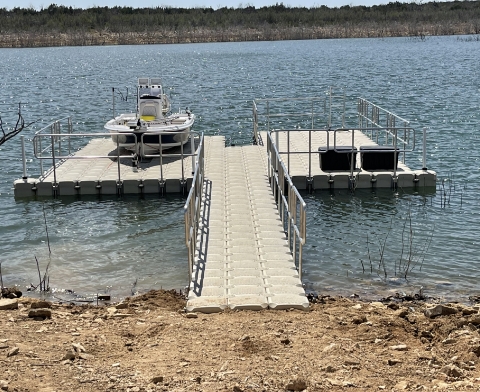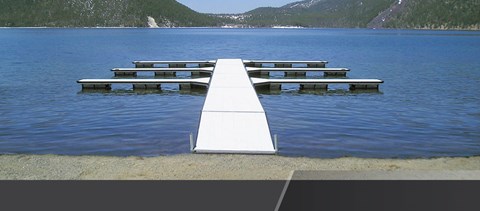Why Your Following Investment Must Be with an Expert Dock Company for Top Quality Docks
The Ultimate Guide to Selecting the Best Floating Docks
Choosing the perfect floating dock calls for a detailed understanding of various aspects that influence both performance and durability. Elements such as dock kinds, products, and crucial features substantially influence your decision-making procedure. Factors to consider around installation and spending plan can even more complicate the option. By examining these aspects systematically, one can make sure an investment that not just meets instant demands yet additionally improves general building value. As we explore these crucial components, it becomes clear that the ideal options can lead to a long lasting and practical solution customized to your certain requirements.
Understanding Floating Dock Types
When choosing a drifting dock, it is vital to comprehend the numerous types offered, as each serves unique objectives and applications. Floating docks mostly drop into three categories: modular, stationary, and pontoon docks.
Modular docks are composed of private sections that can be conveniently assembled or reconfigured, making them ideal for transforming water levels and diverse usages, such as industrial procedures or entertainment tasks. Their flexibility enables for modification based upon certain needs.

Pontoon docks are defined by their buoyant framework, commonly made up of several pontoons that give stability and support. They are especially appropriate for larger vessels and are typically used in marinas or for beachfront buildings. Recognizing these types aids in choosing one of the most appropriate floating dock to meet specific requirements, making certain ideal functionality and security.
Key Products for Sturdiness
Picking the right materials for floating docks significantly influences their longevity and long life. One of the most typical materials include wood, plastic, metal, and composite products, each offering unique benefits and limitations.
Wood, frequently favored for its visual allure, calls for regular upkeep to hold up against moisture and decay. Pressure-treated lumber can improve resistance to rot, but it might still be susceptible to parasites and weathering.

Plastic docks, made from high-density polyethylene (HDPE), are immune to deterioration, UV radiation, and effect, making them a popular choice for coastal environments. Their light-weight nature also facilitates simple installation and moving.
Steel docks, usually created from aluminum or galvanized steel, give phenomenal strength and resilience. They are resistant to deterioration, specifically when treated, yet may require added insulation to stop heat accumulation in hot climates.
Composite products, integrating timber fibers and plastics, provide the advantages of both wood and plastic, withstanding dampness and fading while calling for minimal maintenance. - floating dock builder
Eventually, the option of materials need to straighten with environmental problems, meant usage, and maintenance choices to guarantee the floating dock remains useful and cosmetically pleasing over time.
Crucial Features to Think About
While the option of materials is vital, taking into consideration necessary functions for floating docks is just as get more important to guarantee ideal performance and customer complete satisfaction. One vital function to evaluate is the dock's buoyancy capability, which establishes how much weight it can sustain without immersing. floating dock builder. This is crucial for fitting boats, individual boat, and even leisure tasks
In addition, mobility is a significant factor to consider. Depending upon your needs, you may want a dock that is easy to dismantle and deliver, particularly if you prepare to transfer it seasonally. Security is an additional crucial feature; a well-designed floating dock must minimize activity caused by wind and water currents, offering a protected platform for customers.
Safety and security attributes, such as non-slip surfaces and rounded edges, are also essential to stop accidents, particularly in damp problems. Think about the accessibility of devices, such as bumpers, cleats, and ladders, which can enhance the functionality of your dock.
Installation and Upkeep Tips
Setting up and maintaining a drifting dock calls for mindful preparation and attention to detail to ensure its longevity and ideal efficiency. Begin by choosing a suitable place that lessens exposure to solid currents and waves, which can trigger deterioration. Make sure that the water deepness is sufficient for the dock's height which it is secured securely website here to avoid motion.
During installment, adhere to the manufacturer's guidelines closely, as inappropriate assembly can endanger stability. Use premium products immune to corrosion, such as light weight aluminum or treated wood, to improve toughness. Frequently examine all elements, consisting of floats, ports, and anchoring systems, for indications of damage or wear.
Maintenance is crucial for prolonging the life of your dock. Tidy the surfaces regularly to avoid algae build-up and look for any loosened fittings that may call for firm. If your dock makes use of flotation tools, ensure they remain free and intact from slits. In addition, think about applying protective coatings to wooden parts to reduce weathering impacts. By adhering to these installation and upkeep pointers, you can take pleasure in a practical and trusted floating dock for many years to find.
Budgeting for Your Dock
Budgeting for your dock is a crucial step that can considerably influence your total complete satisfaction and investment in a beachfront residential or commercial property. Establishing a clear budget helps you browse the different choices offered and ensures you make informed decisions that straighten with your economic capacities.
Begin by identifying the size and design of the dock you need, as these variables will substantially affect the price. Floating docks can vary considerably in price, depending upon materials, buoyancy, and functions like ramps and devices. Study different producers and suppliers to compare rates and understand the marketplace value.
Along with first costs, consider continuous expenses such as upkeep, insurance coverage, and prospective fixings. Designate funds for these repeating prices to stay clear of shocks down the line. It's also prudent to budget plan for any kind of required licenses or inspections, which may be called for by local regulations.
Last but not least, maintain in mind the potential roi. A tactical dock can improve your residential or commercial property's value and allure, offering a positive financial impact in the long term. By budgeting properly, you can ensure that your dock fulfills your demands without compromising your financial stability.
Verdict
In verdict, choosing the suitable floating dock necessitates a detailed examination of numerous variables, consisting of dock types, products, crucial Check This Out functions, and installation processes. Cautious consideration of monetary restraints will better ensure a sound investment.

While the selection of materials is critical, considering essential attributes for floating docks is just as essential to make certain optimum performance and customer complete satisfaction.Setting up and preserving a floating dock needs careful preparation and interest to detail to guarantee its durability and optimum performance. Floating docks can differ substantially in cost, depending on materials, buoyancy, and attributes like ramps and devices.In final thought, picking the perfect floating dock requires a thorough analysis of various factors, consisting of dock kinds, products, vital functions, and installment processes.